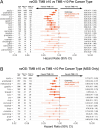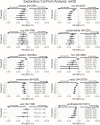Tumor mutational burden and survival on immune checkpoint inhibition in >8000 patients across 24 cancer types
- PMID: 39915003
- PMCID: PMC11815411
- DOI: 10.1136/jitc-2024-010311
Tumor mutational burden and survival on immune checkpoint inhibition in >8000 patients across 24 cancer types
Erratum in
-
Correction: Tumor mutational burden and survival on immune checkpoint inhibition in >8000 patients across 24 cancer types.J Immunother Cancer. 2025 Mar 3;13(3):e010311corr1. doi: 10.1136/jitc-2024-010311corr1. J Immunother Cancer. 2025. PMID: 40032604 Free PMC article. No abstract available.
Abstract
Background: There is uncertainty around clinical applicability of tumor mutational burden (TMB) across cancer types, in part because of inconsistency between TMB measurements from different platforms. The KEYNOTE 158 trial supported United States Food and Drug Administration (FDA) approval of the Foundation Medicine test (FoundationOneCDx) at TMB≥10 mut/Mb as a companion diagnostic (CDx) for single-agent pembrolizumab in second+line. Using a large real-world dataset with validated survival endpoint data, we evaluated clinical validity of TMB measurement by the test in over 8000 patients across 24 cancer types who received single-agent immune checkpoint inhibitor (ICI).
Methods: Patients with advanced-stage cancers from 24 cancer types treated with single-agent anti-PD(L)1 therapy in standard-of-care settings were included. Deidentified data from electronic health records from approximately 280 cancer treatment facilities were captured into a clinico-genomic database. This study used the TMB algorithm from the FDA-approved test supporting solid tumor CDx and composite mortality variable validated against the national death index: real-world overall survival (rwOS). Following a prespecified analysis plan, rwOS by TMB level was assessed using Cox PH models adjusted for Eastern Cooperative Oncology Group performance status, prior treatment, microsatellite instability, sex, age, opioid rx pretherapy, and socioeconomic assessment.
Results: 8440 patients met inclusion criteria. Adjusting for aforementioned factors, increasing TMB was significantly associated with rwOS across tumor types; HRs (95% CIs) relative to TMB<5: TMB 5 to <10: 0.95 (0.89 to 1.02), TMB 10 to <20: 0.79 (0.73 to 0.85), TMB≥20: 0.52 (0.47 to 0.58). For individual cancer types with prespecified statistical power, adjusted rwOS comparing TMB≥10 vs TMB<10 significantly favored TMB≥10 in 9 of 10 cancer types. In microsatellite stable subcohorts (except colorectal cancer), TMB≥10 remained associated with enriched ICI benefit. Exploratory assessments of patients receiving ICI+chemotherapy (n=4369) observed more favorable rwOS only in TMB≥20.
Conclusions: Across >8000 patients treated with single-agent ICI, and within individual cancer types with sufficient power, elevated TMB based on the FDA-approved CDx was associated with more favorable rwOS compared with similar patients with lower TMB levels. This biomarker deserves further clinical investigation to potentially guide the use of immunotherapy in expanded clinical contexts.
Keywords: Biomarker; Immune Checkpoint Inhibitor; Immunotherapy; Tumor mutation burden - TMB.
© Author(s) (or their employer(s)) 2025. Re-use permitted under CC BY-NC. No commercial re-use. See rights and permissions. Published by BMJ Group.
Conflict of interest statement
Competing interests: Financial disclosures: GL, JQ, RSPH, JSR, DF, GRO and RG are employees of Foundation Medicine, a wholly owned subsidiary of Roche and have equity interest in Roche. Roche produces atezolizumab, an ICI. JSR also reports activity as a consultant and equity ownership in Tango Therapeutics and Celsius Therapeutics. JS, LB, CC-P and MP are employees of Flatiron Health, which is an independent member of the Roche Group, and stock ownership in Roche. JS also reports equity ownership in Flatiron Health. DG reports institutional research grants from Amgen, AstraZeneca, Genentech, Merck; and consultant/advisory board activity for Adagene (institutional), AstraZeneca (institutional), Roche-Genentech (institutional), Guardant Health (institutional), IO Biotech (institutional), Oncocyte (institutional), OncoHost (institutional), Merck (consultant). NA reports no conflicts since April 15, 2021. NA reports lifetime disclosures of consultancy to Astellas, Astra Zeneca, Aveo, Bayer, Bristol Myers Squibb, Calithera, Clovis, Eisai, Eli Lilly, EMD Serono, Exelixis, Foundation Medicine, Genentech, Gilead, Janssen, Merck, MEI Pharma, Nektar, Novartis, Pfizer, Pharmacyclics, and Seattle Genetics; and institutional research funding (lifetime) from Arnivas, Astellas, Astra Zeneca, Bavarian Nordic, Bayer, Bristol Myers Squibb, Calithera, Celldex, Clovis, Crispr, Eisai, Eli Lilly, EMD Serono, Exelixis, Genentech, Gilead, Glaxo Smith Kline, Immunomedics, Janssen, Lava, Medivation, Merck, Nektar, Neoleukin, New Link Genetics, Novartis, Oric, Pfizer, Prometheus, Rexahn, Roche, Sanofi, Seattle Genetics, Takeda, and Tracon.SG is a Consultant/Advisor for Bristol Myers Squibb, Bayer, Pfizer, EMD Sorono, Merck, Seattle Genetics, Gilead Sciences, Foundation Medicine, Guardant, Loxo Oncology. She is/has served on the Speakers Bureau for Gilead Sciences, Bristol Myers Squibb, Seattle Genetics and Janssen. She has stock options in Moderna, Buo Tech and Nektar Therapeutics. Her Institution has received research funding from Merck, Novartis, EMD Sorono, Gilead Sciences, Bristol Myers Squibb, Seattle Genetics, Moderna, Exelixis, Pfizer. SJK has served in a consultant/advisory role for Bristol Myers Squibb, Merck, Eli Lilly, Astellas, Daiichi-Sankyo, Pieris, Natera, Novartis, AstraZeneca, Mersana, Sanofi-Aventis, Servier, and Coherus. SJK reports stock/equity in Turning Point Therapeutics (ended 6/2022) and Nuvalent (ended 11/2022). MCA reports advisory board participation and honoraria from MSD Australia; honoraria from Pierre Fabre Australia and research funds to institution from MSD Australia and BMS Australia. AM is on speakers bureau with AstraZeneca and Exelixis. He has received honorarium from Taiho Oncology and Eisai and research funding from Pfizer. VS reports advisory board participation for Relay therapeutics, Roche, Pfizer, Bayer, Labcorp, Illumina, Jazz Pharmaceuticals, Aadi Biosciences. RE reports research funding (institutional) from Clovis Oncology, GSK, Merck, AstaZeneca; consulting fees (including participation on Data Safety Monitoring Board or Advisory Board) from Astra Zeneca, Clovis, Eisai, GSK, Immunogen, Mersana, Myriad, Novocure, Onconova, Elevar Therapeutics, Daichi Sankyo; payment for presentations/writing/educational events from Astra Zeneca, GSK, Immunogen, Merck, Medscape, CURIO, Great Debates and Updates; role as GOG P Associate Clinical Trial Advisor; role as Scientific and Medical Advisor to Clearity Foundation. DPC reports activity as a consultant for AstraZeneca, Nexus, Abbvie, Bayer, Boehringer Ingelheim, BMS, Daiichi Sankyo, EMD Serono, GSK, Incyte, Inivata, Inovio, Kyowa Hakko Kirin, Loxo, Merck, Novartis, Pfizer, Takeda, Flame, G1 Therapeutics, GenePlus, Genentech/Roche, Gloria Biosciences, Lilly, Oncocyte, OncoHost, Amgen, Curio Science, Johnson & Johnson, Sanofi, Novartis, Novocure, Janssen, Gritstone, Iovance. JWR reports consulting/advisory board activity for Blueprint, Beigene, Daiichi Sankyo, EMD Serano, Janssen, Regeneron, Sanofi, Biodesix, Bayer, Turning Point, Bristol Myers Squibb, Jazz Pharmaceuticals, Novartis, Roche/Genentech, Boehringer Ingelheim, Merck, SeaGen; and research funding (to institution) from Merck, Novartis, AstraZeneca, Spectrum, Revolution Medicines, Arrivent, IO Biotech, Vitrac. SS reports research funding from Astra Zeneca, Seagen, Eli Lilly, and Sermonix; and consulting for Eli Lilly, Astra Zeneca, Foundation Medicine, Gilead, Seagen, Pfizer, Novartis, Stemline, and Daiichi Sankyo.
Figures





References
-
- Fernandez AI, Robbins CJ, Gaule P, et al. Multi-Institutional Study of Pathologist Reading of the Programmed Cell Death Ligand-1 Combined Positive Score Immunohistochemistry Assay for Gastric or Gastroesophageal Junction Cancer. Mod Pathol. 2023;36:100128. doi: 10.1016/j.modpat.2023.100128. - DOI - PMC - PubMed
MeSH terms
Substances
LinkOut - more resources
Full Text Sources
Medical
Miscellaneous
